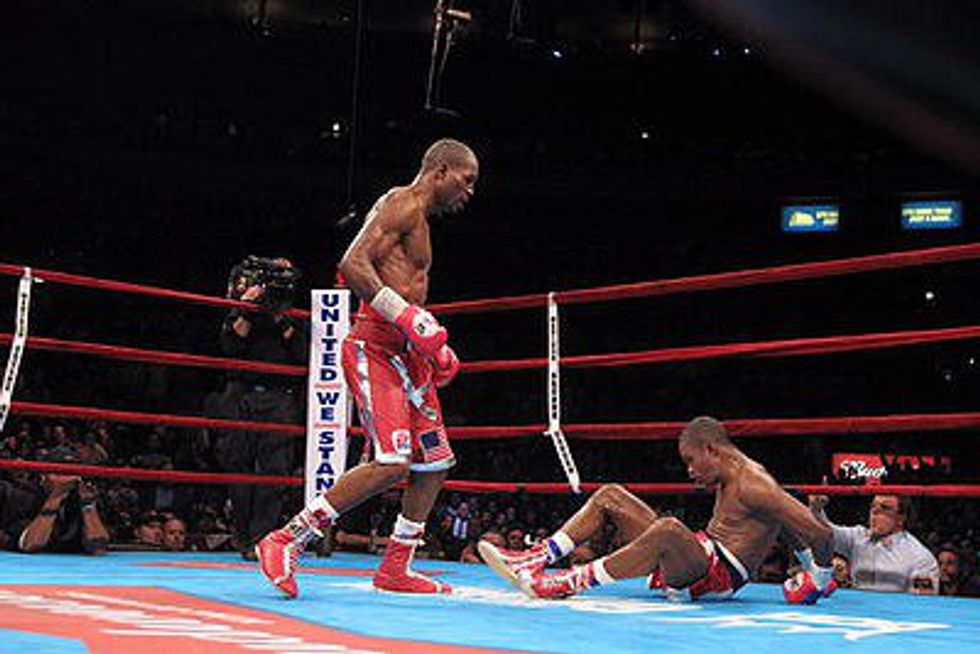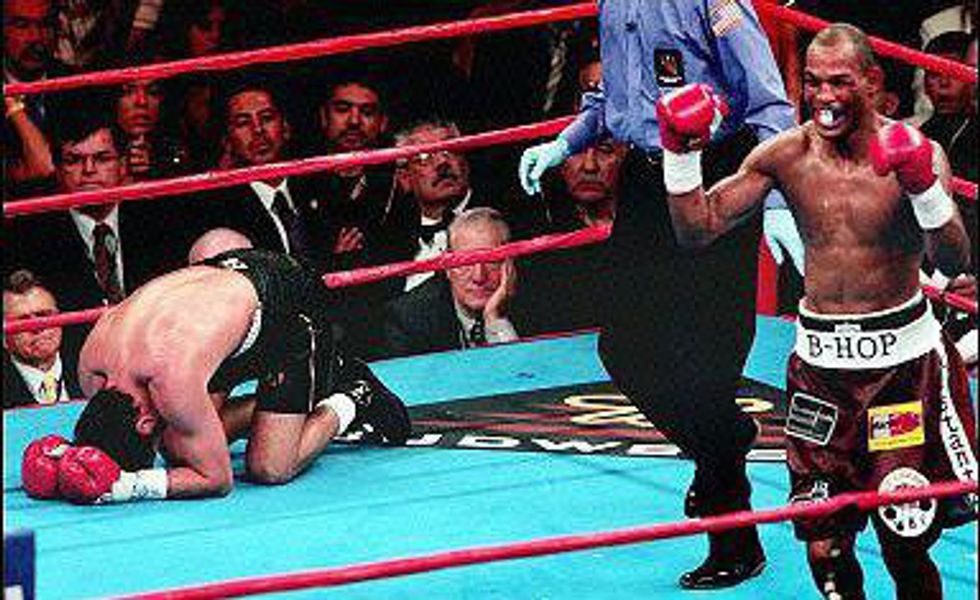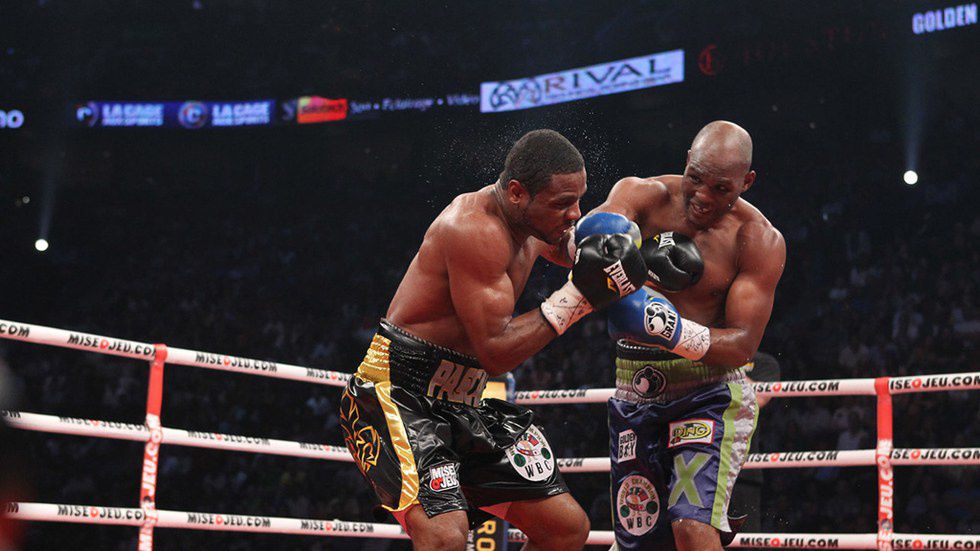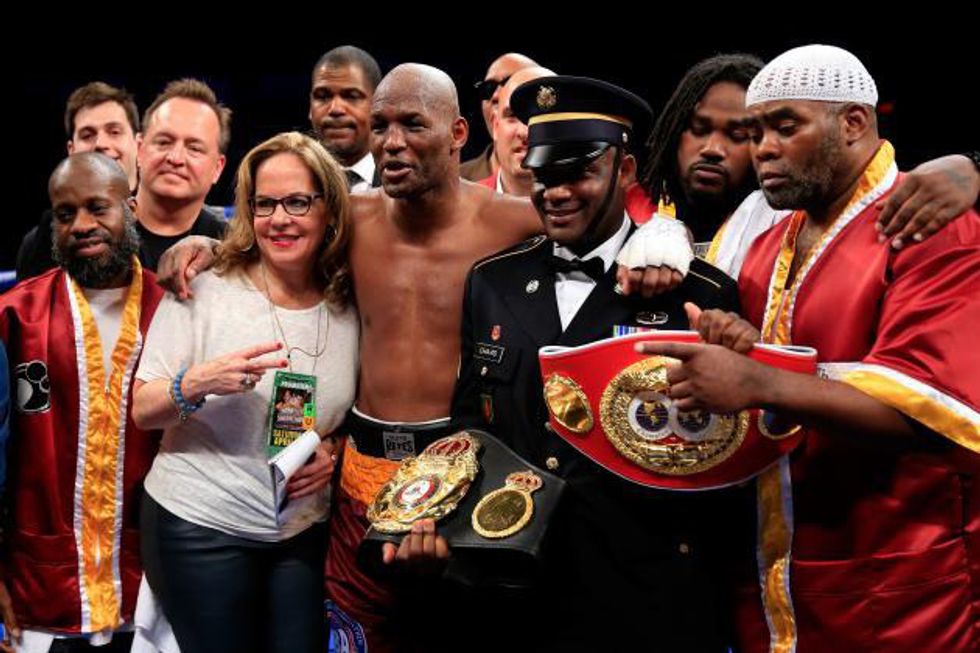Imagine being an 18-year-0ld in the 1980s, growing up on the dangerous streets of Philadelphia. It's a crime ridden world you're living, and you've now succumbed to being a criminal. The end result? Doing time in Graterford Prison and wondering what you'll do to turn your life around. After five years into your sentence, you're now released, and the warden says, "You'll be back" on your way out.
Well, that was Bernard Hopkins during those days, and he never saw the warden again.
Fast forward to 1994, where Hopkins started making himself a household name in the sport of boxing. The first of his many achievements would be against Segundo Mercado, whom he fought twice. The first ended in a draw, but Hopkins won the rematch and became IBF Middleweight Champion.
What happened afterwards would be a run of dominance unlike any other in modern boxing history.
Twenty successful middleweight title defenses, 0 losses and a reign lasting 12 years. A record that still stands to this day, "The Executioner" had reached legendary status before the age of 40. But we'll get to that later on.
In the midst of that reign, Hopkins won the WBA, WBO and WBC middleweight titles, along with the aforementioned IBF middleweight belt. He'd also go through stiff competition as well, some considered as "dream matches."
The first of which took place on September 29th, 2001. The man on the other side of the ring would be none other than Hall of Famer Felix "Tito" Trinidad. Originally scheduled to be on the 15th of that month, the bout was rescheduled due to the 9/11 terrorist attacks. In the buildup to the fight, Hopkins had gotten inside Trinidad's head by throwing a Puerto Rican flag to the ground in front of him while in Puerto Rico. Tensions, to say the least, ran high.
The crowd filled Madison Square Garden to maximum capacity to see the fight determining the best middleweight in the world. When it was all said and done, the Philadelphia-born fighter came out on top, putting on a masterful performance with a 12th round knockout.
There would be no doubt that the then 36-year-old was the king of the middleweights.
The second of these "dream matches" would be against the "Golden Boy" of boxing. Oscar De La Hoya had won the hearts of boxing fans with his good looks, and even better boxing skills. He'd win titles at welterweight and rose up to fight at middleweight. The fight against Hopkins was his second fight at middleweight in his career at the time in 2004.
The pair met in Las Vegas at the MGM Grand, Hopkins being 39 at the time, also eight years the elder of De La Hoya. Like many opponents before him, B-Hop imposed his will on De La Hoya and beat him to the punch time and time again throughout the fight. Hopkins would win via 9th round knockout, with a classic left hook to the body.
Hopkins had cemented his legacy as one of the great middleweights of his generation. Then, two fights later, he had been stunned.
Jermain Taylor had made a name for himself as one of the best middleweights in the world and went on to challenge Hopkins for the undisputed middleweight championship of the world. The 26-year-old out of Arkansas shocked the boxing world, winning by split decision over the 40-year-old Hopkins. Taylor also won the rematch five months later. The long reign of Hopkins of was over.
Boxing experts and analysts were noticing a decline in Hopkins. Was this the beginning of the end? Only B-Hop had the answers.
Back-to-back decision wins over Antonio Tarver and Ronaldo "Winky" Wright meant he wasn't slowing down. Although he'd then lose his next fight to Joe Calzaghe via split decision, Hopkins kept on fighting. The then 43-year-old outclassed both Kelly Pavlik, who defeated Taylor for his middleweight title, and Roy Jones Jr. in a rematch from 1993, where Jones won.
Hopkins kept elevating and improving his Hall of Fame career, and in 2010, at the age of 46, saw history within reach.
Jean Pascal become the king of the light heavyweight division, winning against the likes of Adrian Diaconu and Chad Dawson. Hopkins would challenge the Canadian-born Pascal for his WBC Light Heavyweight title in 2010, at the age of 46. A win for Pascal would give him a massive name on his resume, and a win for Hopkins would make him the oldest fighter in the history of boxing to win a legitimate boxing title, previously held by George Foreman. It was on.
Their first of two fights -- both of which took place in Canada -- ended in a dramatic draw that saw Hopkins comeback after suffering early knockdowns. Their second fight, in Pascal's hometown of Montreal, saw him dethroned to Hopkins. The old man had made history at the Bell Centre that night, winning by decision.
With old school tactics and an excellent defensive style matched with a nice jab, Hopkins was able to keep his boxing career alive. Only age would keep him down.
After dispatching Pascal, Hopkins was set on defending his new crown against Chad Dawson.
The first fight ended in a No Contest after only two rounds, where Hopkins suffered a nasty fall after being tossed by Dawson, injuring his left shoulder. The rematch contested six months later, where Hopkins would lose on a majority decision. He was 47 at that time.
Fast forward two more years, where in 2014, Hopkins was still fighting, ignoring father time en route to making more history. He'd already become the oldest man ever in boxing to win a title, so when he fought Beibut Shumenov in April of that year, the 49-year-old looked set on breaking his own record.
And he did just that. In Washington D.C., he won via split decision to become the new Unified Lightweight Champion. He'd only win twice more after his latest achievement.
He was dethroned by Sergey Kovalev via decision in November of 2011, losing all of his belts. All Hopkins fought for was pride, knowing his place in the sport was well cemented.
And at the age of 51, Hopkins fought Joe Smith this month in 2016, and he lost, literally getting knocked out of the ring. It was over; that was his last dance, his swan song.
Looking back, it's incredible to think how long Hopkins has fought -- 67 fights, 55 wins - eight losses - two draws along with two no contests. In a career spanning 28 years from when he first turned pro in 1988, he's done it all, his way.
From surviving rough neighborhoods in Philadelphia to prison to now being viewed as one of all-time greats, Hopkins had reached the pinnacle after nearly not knowing how to survive. Nobody would believe this if it was made into a movie script.
When he defeated Trinidad back in 2001, he summed himself up to perfection in the post-fight interview with Larry Merchant.
"I want to be judged by my peers not by me reading my own articles," Hopkins said. "I think when it's all done, Bernard Hopkins will be known as one of the greatest middleweights that came along at all times. But in my heart, I knew that I would get another chance in life to redeem myself from what I used to be, into what I am now. I am the American Dream, I am the American story."
Simply put, there will never be another Bernard Hopkins.















































